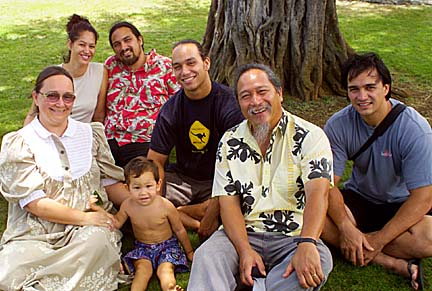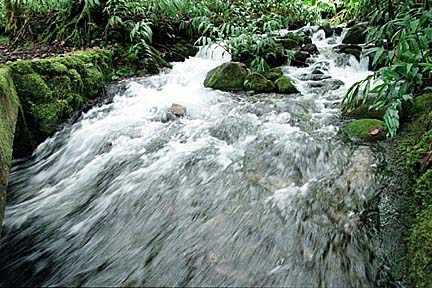


Kahiwa Hoe scurries on the Bishop Museum lawn before darting behind a nearby bush, a favorite game for him. Family’s land love lifelong
EMBRACING THE AINA
crystal kua / ckua@starbulletin.com
At the ripe ol' age of 2, the littlest member of the Hoe family is following in the footsteps of his grandparents, father and uncles with his appreciation of the environment. It has become a family journey that continues to use education and activism as tools to preserve the lifestyle and natural resources of Hawaii.
Back in the 1970s, Kahiwa's "papa" and grandma, Calvin and Charlene Hoe, joined protests and worked "the system" to keep development out of the farmlands and pristine vistas of Waiahole and Waikane valleys and to protect isle waterways from overuse.
They continue their fight today in legal wranglings aimed at keeping water flowing to Windward Oahu in the controversy surrounding the Waiahole Ditch, which has channeled water to Central and Leeward Oahu.

And throughout their quest to teach all who would listen, the longtime educators have always included their sons -- Kala, Liko and Kawai -- in their missions, taking up controversial issues as a family."My life has always been like that," oldest son, Kala, 31, said as he held his mother's arm.
"No choice," his mom giggled.
"I think the fact that Charlene and I did a lot of these things together, there wasn't someone to stay home with the kids so we just brought the kids along," said Calvin Hoe, 56, also a Waiahole taro farmer. "Other families took their kids too and I think it made the efforts and movements more believable when whole families were involved."
The couple have been focused on opening a new public charter school, the Hakipuu Learning Center, this month for up to 40 students with an emphasis on the environment, a school that they, along with other community and family members, have helped nurture.
Calvin and Charlene Hoe's community activism came together when they did. They met when both attended Macalester College in Charlene's home state of Minnesota.
A small liberal arts college, Macalester emphasized community service.
"Macalester certainly encouraged it," said Charlene, now a Kamehameha Schools Elementary art teacher. "A lot of the students did volunteer work throughout the community. Of course, that was the time of the civil rights movement, and we had students go down to the South. It was also Vietnam."
Charlene and Calvin found their calling in working with disadvantaged children in the hospitals and churches of St. Paul. Calvin was also a student teacher in the inner city.
The couple were married in 1968 in Minnesota. They arrived in Calvin's home of Hawaii for two weeks before heading to their Peace Corps assignment in Micronesia, where they taught English as a second language, something that did not sit right with them.
"We were making the same thing happen there that had happened in Hawaii -- English was replacing their own language. It didn't seem like we should be doing that," Calvin said.
They returned to Hawaii in the summer of 1970 and their son Kala was born in August.
Calvin spent the next two years teaching at Kamehameha but found he preferred hands-on teaching outdoors to textbook teaching indoors.
At about the same time, Calvin began making ancient Hawaiian instruments, a nearly lost art.
The family instrument-making business then evolved at the Waiahole Poi Factory, along with a gallery showcasing indigenous and Western art.
Around this period, Calvin also became involved in Hawaiian causes including protesting the eviction by Bishop Estate of the last pig farmers in Kalama Valley to make way for housing developments.
The Waiahole-Waikane land issue consumed much of their time in the '70s, but they were successful in winning preservation for both valleys.
"We kind of do a lot of things as a family and in the Waiahole land issue, we were meeting almost every night but we'd take these two guys (Kala and Liko). They went to all the meetings, they went to all the protests, they were up at the Capitol. Any place we went, these guys all came along," Charlene said.
This and other issues also provided an opportunity for them to also turn on their skills as educators. "The whole issue is a matter of education, we cannot make decisions for people but we can educate them to what the facts are -- and of course, we'll argue for our side," said Calvin, who now works for the Queen Lili'uokalani Children's Center.
Calvin's part-Hawaiian ancestry comes from his mother, whose family owned land for generations in Hakipuu, which also became affected by development as its neighboring valleys of Waiahole and Waikane.
The discovery that water was being diverted from Windward streams -- like the one in Hakipuu -- for use in Central and Leeward Oahu agricultural fields led them to think, "That doesn't seem quite fair," Charlene said.
They and others took an across-the-state journey, with kids in tow, to find out if other places were experiencing the same thing.
"So our community and all of our gang, we shipped a van or a truck or whatever we were cruising around in and we bundled up the family and we went island to island," said Charlene, adding that they found similar stories everywhere they went.
"It was an indicator or symptom of a much larger issue and that was the health of our water resource. We were overdeveloping it."
Charlene became a delegate to the 1978 Constitutional Convention, which produced language in the state Constitution calling for the protection of Hawaii's natural resources.
"It's not the other person's responsibility to make sure that this place, this environment, these resources are here for future generations. We're all responsible. So to the end that we can instill that within our youth, I think we have hope for the future," said Charlene, 54, said.
Kahiwa's dad, 26-year-old Liko, an instructor of Hawaiian religion, mythology and language at Windward Community College, connects what his parents have done with what he's doing now.
"I think the things that we do, the same themes keep coming up," he said with his wife, Hoku, nearby. "I think that because we've always done things as a family it has had a big impact while continuing the same line."
His brother Kala, a firefighter and teacher who's heading back to the classroom at the charter school this fall, said they are finding new ways of carrying on the work through video and media production while his wife, Kapua Sproat, an attorney with Earthjustice Legal Defense Fund and a member of a taro-farming family on Kauai, pursues legal remedies. His youngest brother, Kawai, continues giving workshops on a myriad of Hawaiian skills.
"For me, there are certain main themes about what we do, why we do things and how we do things. To me, it basically comes down to survival," Kala said. "Is this a continuation of what our parents did? Absolutely."